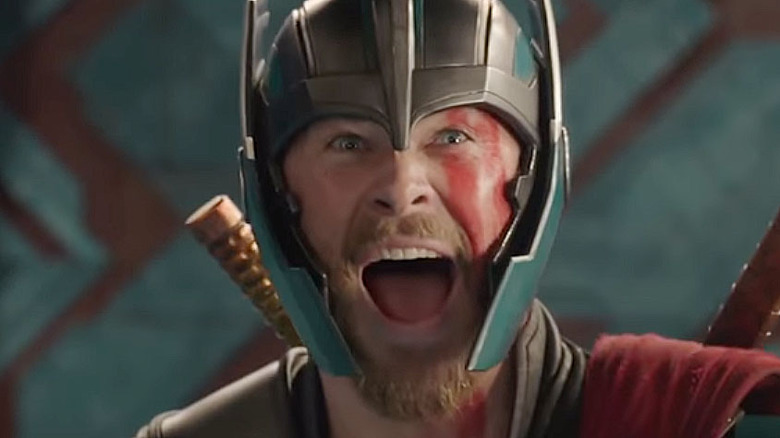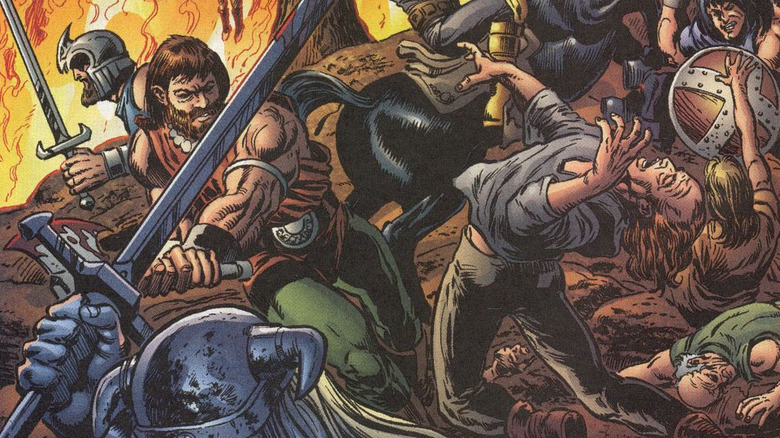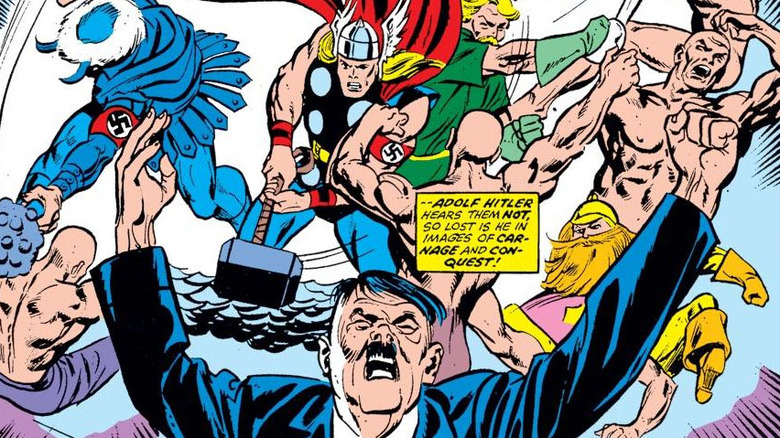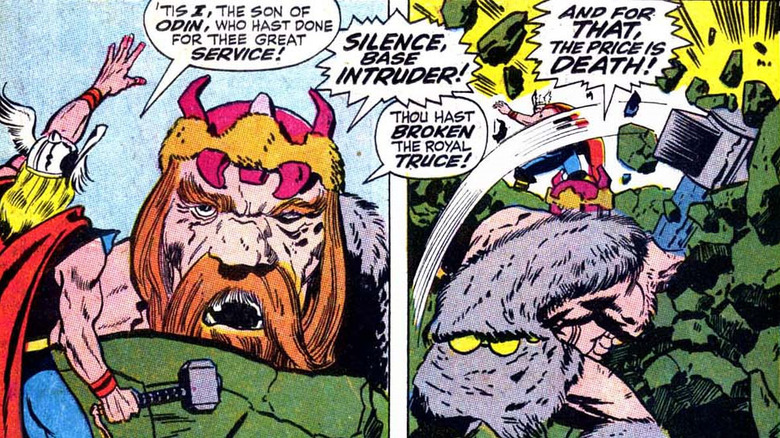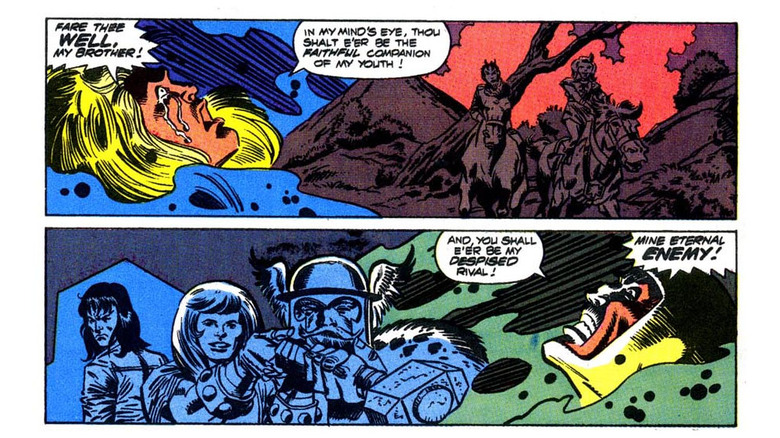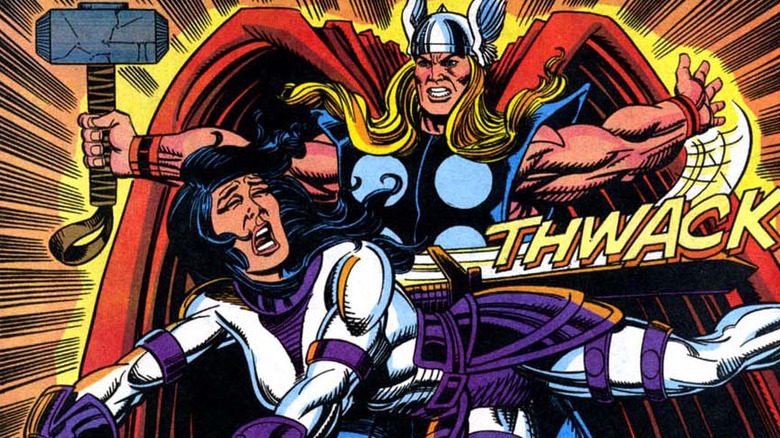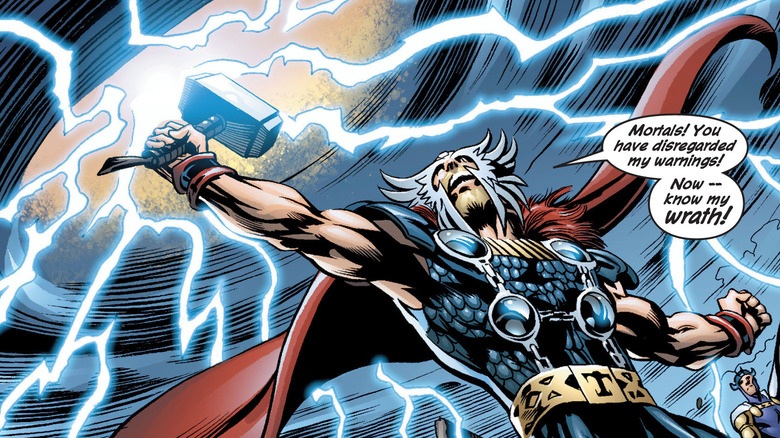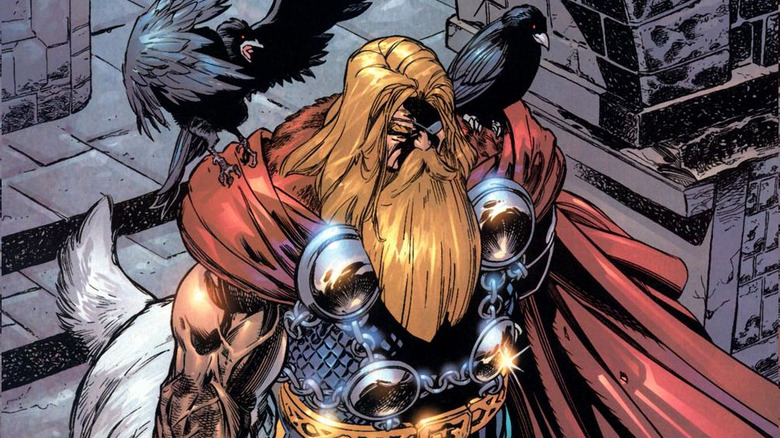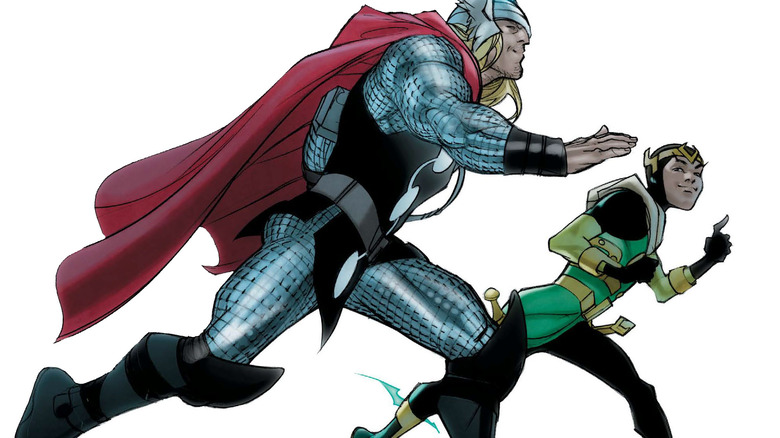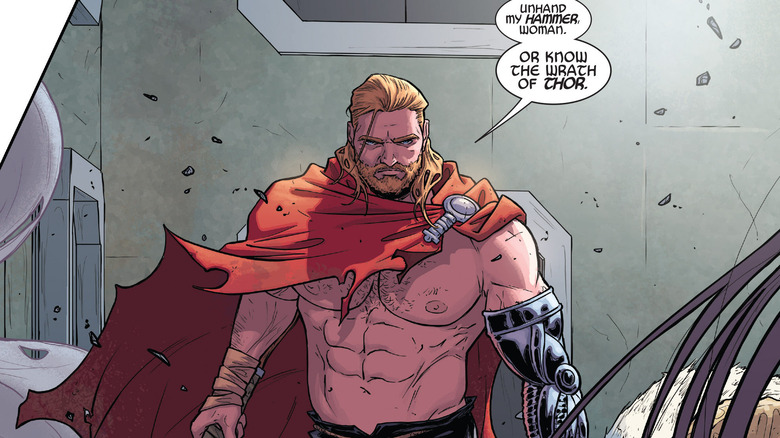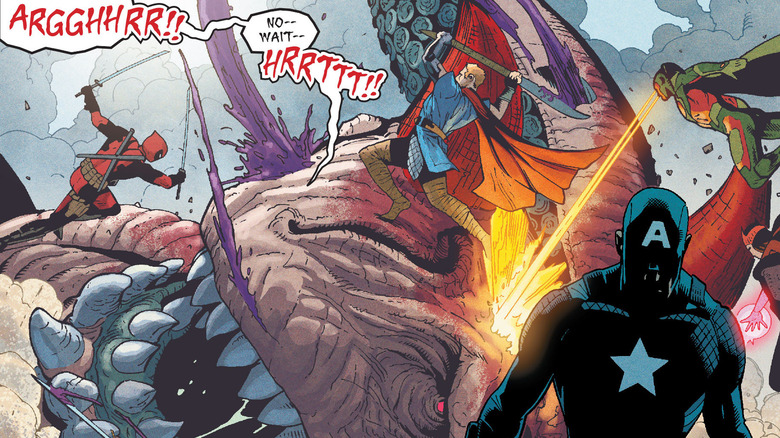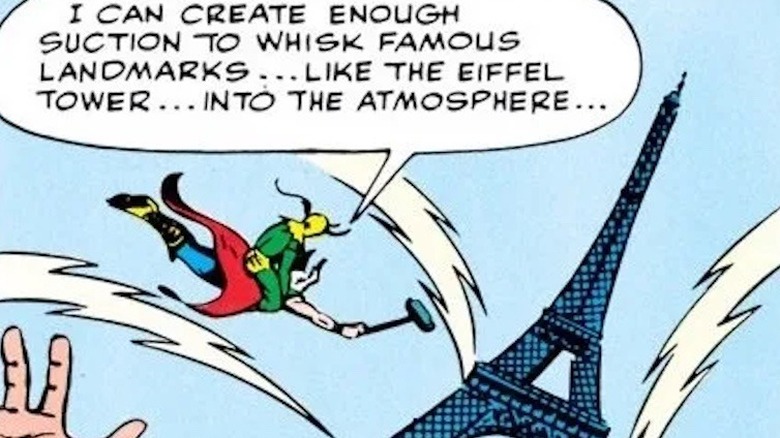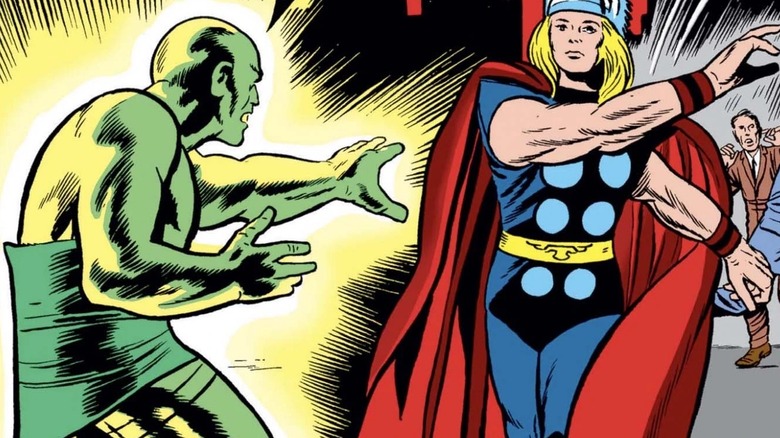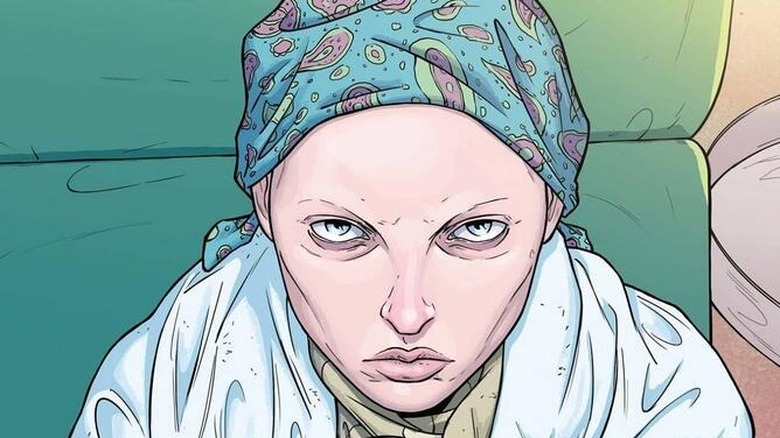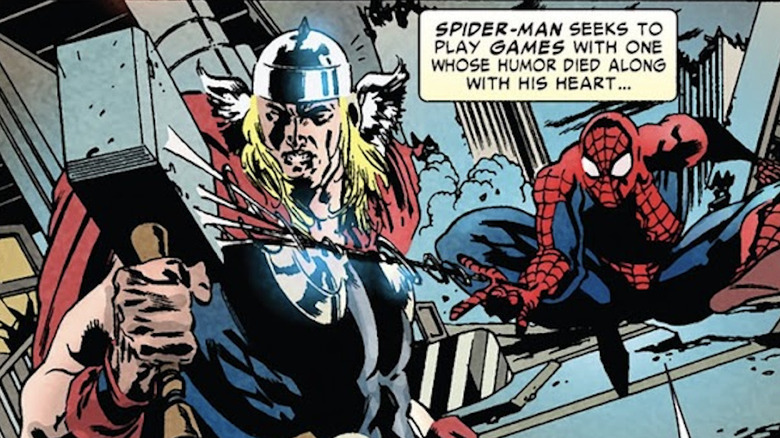The Most Terrible Things Thor Has Ever Done
Thor is loud, brash, cocky, reckless, and violent—and that's when he's a good guy. When he goes bad, he's even worse.
As a warrior god, Thor naturally has a fair amount of blood on his hands, but it's not all of the killing that makes Thor a bad dude. It's that, deep down, he's a spoiled brat. Remember, this is the guy that Odin banished from his home world—more than once—in order to teach him some manners. Thor didn't get his powers from an accident or a lab experiment, either, and he didn't become a hero by choice. He was just born this way—and, for better or worse, that means that Thor's moral compass is just a little skewed. Oh, he tries, but in the end, Thor still has a lot to learn.
He encouraged his followers to commit murder
Given that nobody has really worshiped the Norse gods for centuries, it's easy to forget that Thor and his pals used to have thousands and thousands of real-life worshipers. That's true in the Marvel Universe, too—unfortunately. Back in the age of the Vikings, savage hordes roamed the Earth, slaughtering entire villages full of people in Thor's name—and, in "Thor" #52, we learn that Thor actually encouraged it, right up until he was forced to face the consequences of his actions in the flesh.
Thor's change of heart happened one evening when he decided to surprise his followers with an in-person visit. As a group of Viking warriors murder a local villager, capping off a very successful raid, they dedicate the kill to Thor, and the Asgardian rewards their faith by showing up at their camp later that night. While the warriors are happy to see Thor, the villager's widow isn't. She informs the god that his worshipers are killing defenseless farmers, not fellow soldiers. Thor doesn't believe it. It takes a trip to the battlefield to convince Thor that his encouragement is leading to the massacre of innocent people, not hardened soldiers.
Even then, the Odinson doesn't exactly change his ways. When Thor asks Odin, "If we inspire men to commit such heinous acts, are we not responsible?" Odin tells Thor to back down. Humans, Odin argues, will be better if they choose to condemn wholesale murder on their own, and not because a god demands it. Thor keeps his mouth shut, and humans keep on killing—and, sadly, still do, proving that we have a long way to go before learning Odin's lesson.
He teamed up with Adolf Hitler
It's no surprise that Adolf Hitler would be into a blond-haired, blue-eyed Germanic beefcake like Thor. It's very surprising that the Asgardian god of thunder would be willing to help a genocidal dictator like Adolf Hitler. And yet, while Thor's future ally Captain America introduced himself to the world by punching the fascist leader in the face, Thor spent his brief time in World War II fighting against the Star-Spangled Avenger, Namor, and others in order to help the Nazis kill Joseph Stalin.
He's not brainwashed or mind-controlled, either. In "The Invaders" #32 a Norwegian scientist helps Hitler build a machine that can summon Norse gods by analyzing Wagnerian operas, and Thor arrives in Nazi Germany. Once the god figures out what happened, Hitler explains that he's trying to "free the people of Russia from their evil masters," who want to wipe out the rest of Europe—including the descendants of the people who used to worship Thor, who emigrated to Germany, Norway, and elsewhere. Thor takes him at his word (to be fair, it's not like Stalin was exactly a peach). Later, in "The Invaders" #33, Thor is told that Hitler is a mass-murderer. Thor shrugs it off. "The man called Hitler is loathsome to me," Thor admits, but he remains dedicated to "the protection of the descendants of those who once did worship the All-Father."
In fact, Thor doesn't change his mind until Hitler goes on an anti-Semitic rant, and then tries to summon an army of trolls — Asgard's sworn enemy — to augment his rapidly growing army. That's enough to make Thor realize that, just maybe, Hitler isn't a great guy, and he promptly heads back to Asgard — but not before erasing everyone's memories, making them forget that he ever existed. That's a cop-out, but who can blame him? If you'd helped Hitler, even for just a second, you'd want to make sure that nobody else knew about it, too.
He violated an ancient treaty and almost started a war
Remember, Thor didn't travel to Earth to fight for justice, to stop evil, or to protect the innocent. He was banished to Midgard by his father, Odin, because he was an unrepentant jerk who caused all kinds of problems and needed to learn some humility. In other words, Thor didn't set out to become a superhero. He was just super-grounded.
The first "Thor" movie tells the story pretty well, but the full account first appeared in "The Mighty Thor" #159, which was written and drawn by Stan Lee and Jack Kirby. Years and years ago, Asgard signed a treaty with Niffleheim, land of the storm giants, bringing peace to both worlds. As part of the agreement, no Asgardian is permitted inside Niffleheim. Thor doesn't care. As a young warrior, Thor saunters right into Niffleheim while hunting a monster, and when the giants retaliate—which is perfectly reasonable, given that Thor broke the agreement—Thor starts attacking them with his hammer, Mjolnir. Thor's buddy Balder shows up and bails the thunder god out before a major diplomatic incident begins, but that's not enough to save Thor from Odin's wrath.
Of course, Odin's breaking point doesn't come until a little bit later, when Thor transforms an arm-wrestling contest into a full-on drunken brawl (because somehow that's worse than accidentally starting a war). Odin traps Thor in a frail human body, wipes away all of his memories of godhood, hides Mjolnir, and banishes him to Earth. Once he's learned how to be humble, Thor can return to Asgard. Until then, he'll have to survive as a well-educated, handsome mortal with a hot girlfriend and, presumably, a doctor's salary—so, yeah, given that Thor almost started a war between deities, it looks like he got off pretty easy.
He killed his brother
Loki has been a thorn in Thor's side since the very beginning. In the original Norse myths, Loki crafts a spear out of mistletoe, Balder's one weakness, and tricks Balder's brother Hoder into committing inadvertent fratricide, which also happens to kick off the apocalyptic crisis known as Ragnarok. In the Marvel Universe, he's a straight-up supervillain, who resorts to both petty pranks (chopping off the warrior Sif's hair, for example) and world-conquering schemes in order to get back at Thor, his half-brother.
But family is family, and over the years, Thor's proven that deep down he really cares about his brother. That's why it's such a shame that Thor had to kill him. In "The Mighty Thor" #432, Loki kidnaps Kevin Masterson (son of Eric, who's serving as Thor's Earthly host) and gives Thor an ultimatum: either Thor gives up his hammer, Mjolnir, or Kevin dies. Naturally, Thor doesn't like either of those options, and in true superhero fashion a brawl follows. While the authorities rescue Kevin, Thor defeats Loki, but refuses to kill his brother—giving Loki one last chance to tighten the screws
While Thor is distracted, Loki shoots a bolt of energy at Kevin and his mother, Marcy, intending to murder them. The attack hits Susan Austin, Eric Masterson's assistant, instead. Outraged, Thor realizes that Asgardian justice is "too compassionate" for a criminal like Loki, and fuses with Mjolnir in order to steal the trickster god's life force.
Killing another Asgardian is, of course, a big no-no, and Odin isn't pleased with Thor's decision. As per Asgardian law, Thor is stripped of his royal titles and banished from his home world forever, while his power lives on through Eric Masterson, who takes on Thor's responsibilities while the whole familial drama sorts itself out.
He went insane and tried to destroy the universe
As Odin observes, Thor's been through a lot. He had his memory wiped and lived for years as a limping doctor. He lost his hammer and his honor during a battle with Beta Ray Bill. He was trapped inside Eric Masterson's body, and was forced to kill his half-brother. God or mortal, that kind of stuff weighs on a guy. Eventually, Thor cracks.
Then again, when most people lose it, they end up in therapy or on a steady stream of medication. When Thor goes insane, he creates a sexy alter ego named Valkyrie, falls in love with her (even though she's a figment of Thor's imagination, meaning that he really falls in love with... himself?), and lets her talk him into some truly heinous actions. While under Valkyrie's influence, Thor's crimes include: beating up his fiancee the Lady Sif, his ally Beta Ray Bill, Drax the Destroyer, and a number of Marvel's other cosmic superheroes, stealing the Mind Gem, and using the power to try to destroy Asgard.
It doesn't work, of course. In "The Mighty Thor" #471, a murderer's row of Marvel characters (quite literally—Thanos is one of the team's heavy-hitters) put aside their differences to stop the corrupted thunder god, while Odin invades Thor's mind in order to restore his son's sanity (the other option is killing Thor outright, which Odin seems oddly eager to do). With Odin's help, Thor casts off Valkyrie's shackles—again, literally—and beats his buxom delusion once and for all.
It's a truly happy ending, too: while the punishment for madness is usually banishment, Odin decides to bend the rules just this once, since it's kind of Odin's fault that Thor went crazy in the first place. Besides, Thor's been banished from Asgard half a dozen times, and it never sticks. Why would anything be different this time around?
He invaded a sovereign nation and almost started a world war
Thor isn't just a god. He's also a prince. That means that, in addition to fighting evil, Thor is eventually going to have to take Odin's place as the All-Father. In the early 2000s, Thor's first reign as the ruler of the gods began, and as it turns out, the thunder god made the right call in the past when he did everything he could to avoid a leadership position. Thor might be an excellent warrior, but he's a terrible, terrible king.
For example, in "Thor" #58, soldiers in the dictator-run country of Slokovia gun down a group of rebels who worship Thor. In response, Thor dispatches a squad of Asgardian soldiers to decimate Slokovia's army. That seems like a simple solution, but international politics is not a simple problem. See, Slokovia shares a border with Latveria, where Doctor Doom reigns supreme. Not only will overthrowing Slokovia's government plunge the country into civil war, completely destabilize the region, and likely provoke Doom into responding, but the implication that Asgard is willing to conquer any country it disagrees with doesn't sit well with Tony Stark, S.H.I.E.L.D., or Thor's fellow Avengers.
Iron Man's fears are well-founded. Instead of submitting after Asgard's attack, the Slokovian government uses the emerging Thor-focused cults as a pretext for rounding up citizens of Nordic descent. NATO and the United States military start deploying forces to the Slokovian border. With tensions nearly at their breaking point, Iron Man tries to talk Thor down. It doesn't work. Thor and Iron Man come to blows, and Doctor Doom launches an attack on the Asgardian army. If it hadn't been for Captain America's last-minute intervention, it would've been World War III, and it would've been Thor's fault.
He conquered the Earth
It doesn't take long for all of that power to go to Thor's head. In "Thor" #68, the title of the long-running comic series is changed to "The Mighty Thor: Lord of the Earth." If that sounds ominous, well, buckle up. It's worse than you can imagine.
"Thor" #68 flashes forward to the year 2020, when a war between humans and the gods ended with Thor in charge. New York is a wasteland, ravaged by an attack that also leveled Asgard. Every human baby is registered at birth, and monitored in case they become potential threats to the Asgardian regime. Resistance movements, including one led by the Avengers, have been quelled—there are very few survivors. Loki and the Enchantress serve as Thor's primary advisers, and help him "re-educate" dissidents, including Thor's ex-girlfriend, Jane Foster.
Thor's regime isn't a flash in the pan, either. It lasts for hundreds of years. Over time, Thor eliminates famine, war, and poverty, but he also locks up unbelievers in reconditioning centers, where Loki makes them compliant using magic. Humanity loses its will to live, leaving buildings unfinished and refusing to strive for anything better. If there aren't any problems, what's the point? Even worse, when Thor falls into the Odinsleep, which is necessary to restore his powers, Loki and the Enchantress take control. It goes about as well as you'd expect.
Ultimately, of course, everything is fine—a little bit of time travel saves New York City and puts everything back the way it should be—but in some senses, the damage is already done. While Thor doesn't end up conquering the world, he knows that he would've if the older, despotic Thor hadn't traveled to the past to set things right, and he'll have to live with that until the end of his days—which, given that Thor is immortal, is a very, very long time.
He brought back Loki
As has been established, Loki is a bad dude, and both the Earth and the realms beyond are better without him around to cause problems. Thor doesn't care. In "Thor" #617, Thor restores Loki's powers and some of his memories simply because he's lonely. That's akin to Batman giving the Joker a "Get out of jail free" card, and it doesn't work out well for anyone involved—Loki included.
Loki died while protecting Asgard from the Sentry, but before his demise the trickster planned ahead, and he was reborn as a child. Thor finds Loki in France running a small-time confidence trick, and quickly brings him back to Asgard. That's a mistake. For one, the rest of the Asgardians hate Loki—who doesn't remember what he's done, outside of some guilty nightmares—and relentlessly bully the child. Odin, Loki's adopted father, calls him a whelp and blames him for Asgard's fall. Iron Man flat out attacks him.
Thor isn't innocent, either. During a battle against Galactus in the early issues of "The Mighty Thor," Loki performs some subterfuge in order to save Thor, Asgard, and Earth. In response, Thor wrings Loki's neck and threatens to kill him—even after Loki convinces his elder brother that he didn't mean any harm, Thor doesn't trust him.
All that, and Loki's newfound heroism doesn't even last. Eventually, Loki reverts to his old self, and returns to his villainous ways. Thor turns his back on his brother again, and, for better or worse, everything goes back to normal.
He beat up his ex
Only a worthy champion can lift Mjolnir, Thor's mystical hammer—so what happens when Thor himself isn't? That's the question both raised and answered in Jason Aaron's recent run on Thor, which sees the original Thor (referred to as the Odinson) lose his faith in his godhood, and thus his worthiness, and in which Thor's former flame Jane Foster assumes her one-time lover's mantle.
The Odinson still wants that hammer, however, and he's willing to fight anyone to get it back—even his old girlfriend. Oh, and did we mention that Jane Foster is also dying of cancer, which will ravage her body as soon as she returns to her mortal form? As a result, the fight that breaks out in "Thor" #4 is between an immortal thunder god and a sick woman, and if you have any kind of problem figuring out who the bad guy is in that situation, you need to seriously reconsider your outlook.
The fact that the Odinson doesn't know that it's Jane under that winged helmet only mitigates his guilt a little bit. Jane tries to resolve the conflict over Mjolnir peacefully, but the Odinson hits her with a sucker punch. When he loses his axe, Thor gives him an opportunity to surrender. He doesn't take it. The new Thor beats the Odinson—with Mjolnir at her side, she's more powerful than he is—and the Odinson eventually gives up his title (he gets to keep his godhood, of course) willingly. It just takes a few hammer-blows to the face first.
He joined Hydra
Remember way back at the beginning, when Thor worked for Hitler? As it turns out, it's just as hard for Norse gods to shake old habits as regular old humans. In "Secret Empire" #1, the Odinson is—along with the Scarlet Witch, Doctor Octopus, Deadpool, and a few others—one of Captain America's personal Avengers (that's him in the blue). Given that, in this story, Captain America is the head of Hydra and the newly crowned ruler of the United States of America, maybe you can see the problem.
And, y'know, Asgard is a monarchical society, and as we've seen, the Odinson has a predilection for supporting (or establishing) fascist regimes. Given that, maybe the former Thor's alliance with Hydra isn't a surprise at all. Still, it's not a good look for the thunder deity, and while most readers are pretty confident that Captain America will be redeemed by the time that Secret Empire ends, it's going to be a little harder to clean up Thor's image. After all, team up with a Nazi once, and you can write it off as a mistake. Team up with Nazis twice, and it starts to look like a pattern—and not a very good one.
He destroyed multiple major world landmarks
The 1963 Marvel Comics title "Journey Into Mystery #94" finds Thor summoned into one of his many sibling rivalry battles with Loki, this one of epic and destructive proportions. After an American military base launches a test missile that veers off-course — Loki's magical doing — Thor tries to stop it with a toss of Mjolnir. Loki conjures a vision of a dragon to distract his brother, confusing him so much that Mjolnir strikes him. That gives Loki an opening to take over Thor's mind, and he orders him to come to Asgard and release him from his imprisonment. Loki then tells their father, Odin, to surrender the throne of Asgard, swearing to make mischief on Earth until he does.
The "mischief" they wreak is actually irreparable international chaos. Under the command of Loki, Thor creates monumental earthquakes and storms that shatter and detach many of the world's most famous and precious monuments. Thor devastates the Leaning Tower of Pisa, the Golden Gate Bridge, some ancient Egyptian pyramids, the Eiffel Tower, the Taj Mahal, and, when approached by diplomats and carted off to United Nations headquarter, the logo of the U.N. in a highly symbolic act of war. The end of Thor's reign of destruction is provided by, of all things, a trap door. He falls through it, his mighty hammer hits him on the head, and he regains control of his mind.
He kills a nuclear villain that kills a lot of civilians
Decades before "The Simpsons" parodied atomic age superheroes with Bart's favorite comic book character Radioactive Man, a similar character appeared in the pages of Marvel Comics. In 1963's "Journey Into Mystery #93," Thor visits a war-ravaged region of India to offer his medical assistance under the guise of his mild-mannered regular-human persona Dr. Donald Blake. Bombs start dropping, Dr. Blake turns into Thor, and the mighty hero easily dispatches the adversarial army from China.
China's government is furious and orders their top scientists to devise a way to kill Thor, prompting nuclear expert Chen Lu to come up with a way to stop not only Thor but to destroy all the free nations of the world and allow Chinese communism to reign supreme. To do so, he willingly exposes himself to high doses of radiation, turning himself into a glowing green humanoid beast named Radio-Active Man. Snuck into the U.S. by a Chinese submarine — effectively a declaration of war — Radio-Active Man goes looking for Thor, who is up to the challenge. Radio-Active Man hypnotizes Thor and convinces him to dispose of Mjolnir, throwing it as far away as possible.
When Thor comes to and gets his hammer back, he relocates Radio-Active Man and conjures a tornado that carries his foe back to China. Radio-Active Man violently crashes and dies in his country of origin, creating a massive nuclear blast that likely kills millions of innocent Chinese citizens.
Thor behaved abominably toward Jane Foster
The 2022 Marvel Cinematic Universe entry "Thor: Love and Thunder" pulls some of its exposition, plot, and character info from recent Thor comics. In the film, Jane Foster (Natalie Portman) is essentially the new Thor, a hero worthy of wielding the mighty Mjolnir while also undergoing treatments for terminal cancer. Those elements stem from Jason Aaron's 2010s run on "Mighty Thor" Issue #20 of that series (via Bleeding Cool) added some extra agony for Jane by making Thor a jealous, unrepentant cad. Jane pours her heart out to her former paramour, discussing the humbling power and responsibility that comes with her position. She's pale, emaciated, and suffering from both cancer and the harsh treatments for the disease as she tenderly unspools her thoughts.
No longer (or at least temporarily) the Thor of record and jealous that someone else has been "parading around" with his precious Mjolnir, the Norse god is so miffed that he picks this tender moment to let Jane know that back when they were together he engaged in numerous "dalliances." In other words, he cheated on her, and he's telling her about it now as a way to get back at her.
Thor killed Spider-Man and The Thing
This event only happened because Marvel Comics has multiple versions, runs, and universes for their various properties, because it would've been catastrophic for business (and comics in general) if one of their most likable heroes murdered two of its other most popular good guy characters.
In the finale of the 2011 five-issue miniseries "Thor: First Thunder," a new origin story of the Asgardian god and hammer-wielding superhero, Thor shows up in New York City. However, this is not the nice and charming Thor of the Marvel Cinematic Universe. This is a violent, unhinged, and uncontrolled Thor, as Loki has taken over his brother's mind to make him commit all kinds of destructive acts, including picking a fight with some well-established superheroes.
In the epic, climactic superhero melee in midtown Manhattan, Thor gives Mjolnir a toss at Spider-Man and connects. The enchanted hammer flies all the way into space, where our friendly neighborhood Spider-Man quickly dies on account of how humans cannot survive in an oxygen-free environment. By the time Mjolnir dutifully returns to Thor back in New York, the Fantastic Four have entered the fray, but then Thor uses his hammer to beat rock-man The Thing to death. There's at least a happy ending: After Thor breaks free of his hypnosis, he's so upset that his father, Odin, reverses everything and erases the world's minds of the memory.
